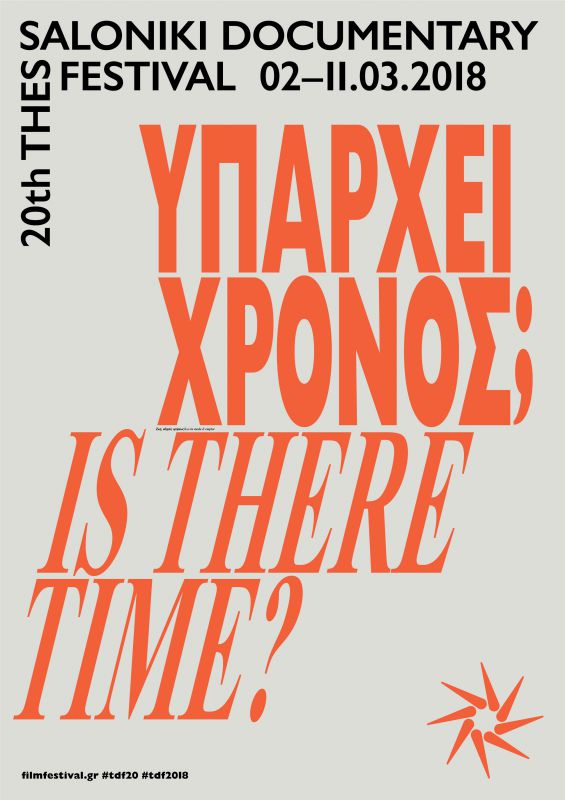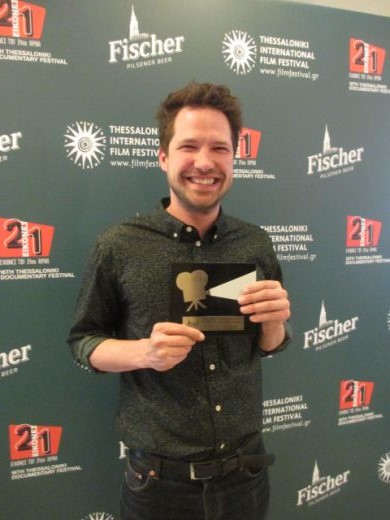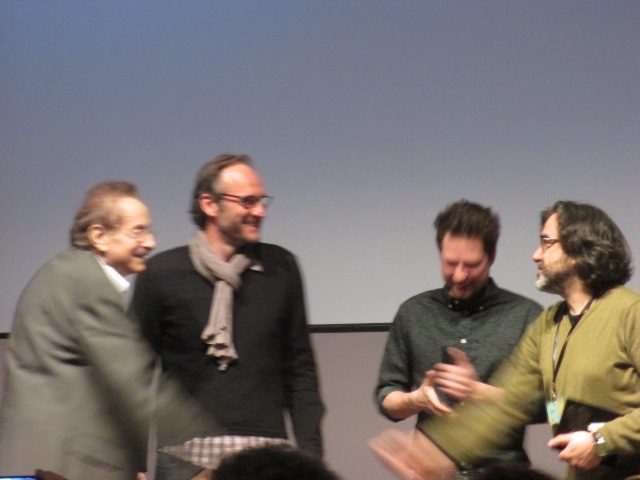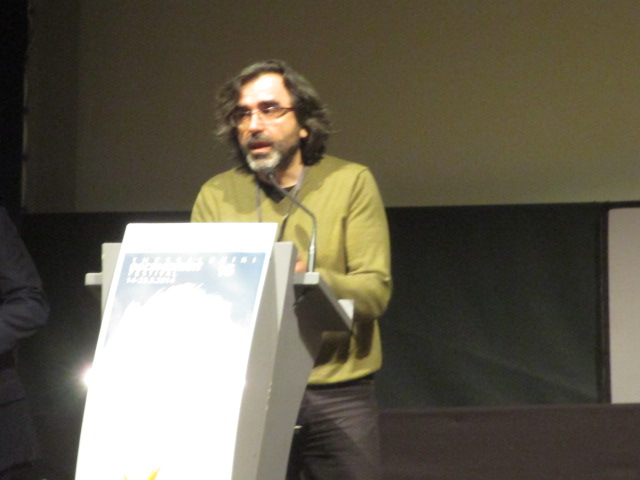|
|
||
|
Pro Tools
FILMFESTIVALS | 24/7 world wide coverageWelcome ! Enjoy the best of both worlds: Film & Festival News, exploring the best of the film festivals community. Launched in 1995, relentlessly connecting films to festivals, documenting and promoting festivals worldwide. Working on an upgrade soon. For collaboration, editorial contributions, or publicity, please send us an email here. User login |
16th TDF Tributes: Nicolas Philbert & Peter Wintonick
Peter Wintonick Tribute: Few people have contributed to the documentary universe as invaluably as Peter Wintonick (1953-2013). The Canadian director, producer, programmer, writer and film critic has fervently served the documentary realm in his various capacities and has become a mentor for generations of documentary professionals. The 16th Thessaloniki Documentary Festival honours the award-winning filmmaker with a tribute that comprises some of his most representative work, as well as an original bilingual edition on his work. It is in his memory that the TDF now establishes the Peter Wintonick Audience Award that is to be presented to the best foreign feature documentary of the Festival. Peter Wintonick was a close friend, collaborator and supporter of the TDF from its very start. He has always been passionate in his participation to the various facets of the Festival, whether they were panels, workshops, the Just Talking conversations or the Presidency of the FIPRESCI jury. Peter Wintonick has traveled the world, sharing his knowledge and love of documentaries. He participated in over 100 films and transmedia projects, in many festivals as an advisor, jury member, speaker or co-ordinator. He notably won the Canadian Governor General's Award in 2006 for Visual and Media Arts, and was one of the founders of DocAgora, which showcased cutting-edge digital strategies at various film festivals. Manufacturing Consent: Noam Chomsky and the Media (1992), co-directed by Mark Achbar, is perhaps Wintonick’s most influential film. A portrait of Noam Chomsky, it offered a unique exposé of mass communication propaganda systems. It was screened in over 300 cities around the world, winning numerous awards and taking part in over 50 festivals. It became the top-grossing Canadian documentary feature in history (until 2003 when The Corporation beat the record). With Cinéma Vérité: Defining the Moment (2000) Wintonick documents the film movement’s history from its first steps (Nanook of the North) up to its more recent versions (Blair Witch Project). From film history to contemporary activism, he moves with Seeing is Believing: Handicams, Human Rights and the News (2002, co-directed by Katerina Cizek) into the territory of the audiovisual revolution that the movie camera has brought forth. China Heavyweight (2012) by Yung Chang is the last completed documentary that Wintonick worked on as a producer. Through the story of two teenage boxers training for the Olympics the film unfolds the ever-evolving story of a country in constant flux. Peter Wintonick’s last completed documentary in his directing capacity is pilgrIMAGE (2009) co-directed with his daughter Mira Wintonick, which travels the (film) world, tracing the past and future of film and media, from George Méliès’ France to the Venice Biennale. Mira Wintonick will be taking on her father’s unfinished project Be Here Now, which he was, in a way, preparing for 20 years, but only started planning when he fell ill. The film will explore the world’s imagined Utopias, from Don Quixote’s idealism in Spain, to an artist co-op in the Australian Outback, to Gandhi’s backyard of peaceful resistance, while at the same time painting an intimate portrait of the filmmaker.
Nicolas Philbert Tribute: “Sometimes nobody is more surprised by a film than the person who made it”. Nicolas Philibert is mostly known for his award-winning documentary To Be and to Have (2002), his touching portrait of an one-room school in the French countryside. Driven by a curiosity to apprehend the world around him, Philibert observes the mundane with an uncanny devotion. If something might come as a surprise while watching his films though, it is not the variety of his themes, but his respect while approaching them. Born in 1951 in Nancy, Nicolas Philibert studied philosophy, but he very soon turned to film and became an assistant director, notably for René Allio, Alain Tanner and Claude Goretta. From 1978 he has been directing documentaries of varying content that covers a gamut from the adventures of mountaineers to the unspoken secrets of the Louvre museum. The director will attend the Festival to present and discuss his work with the Thessaloniki audiences and guests. Apart from To Be and to Have, the tribute to Nicolas Philibert comprises eight more of his films. His first documentary His Master’s Voice (1978, co-directed by Gérard Mordillat) is an insightful exposition of the new world order that was at the time on the cusp of its manifestation. With Louvre City (1990) he enters the universe of the Louvre Museum and monitors all that’s unseen behind its closed doors. By documenting the every-day rituals in its rooms, corridors and tunnels, he unveils a world of secrets and discoveries. He will again enter a museum’s den, this time Paris’ National Museum of Natural History during its renovation, to create a different kind of choreography with the Animals (1994) that are on display in its halls. It is one specific animal that becomes the protagonist in one of his more recent films, as Philibert watches the 40-year-old orangutan Nénette (2009). The filmmaker turns his camera on Nénette as she spends her days in a cage in Paris’ Botanical Gardens, but his mic listens in on the visitors who observe her on the other side of the looking glass. Philibert delves into another world, one that most people observe also from afar, and uniquely captures the lives and experiences of different deaf people with his In the Land of the Deaf (1992). “Giving voice” to those who go unheard, takes on quite a melodic presence here. In a similar way, he “lends” his eyes to those who go unseen, with La maison de la radio (2012), Philibert’s most recent film that documents the interactions of Radio France’s employees and guests. A medium that resides solely in its audience’s aural sphere finally claims its visual representation. The residents of the psychiatric asylum La Borde rehearse their annual theatre play and Nicolas Philibert follows them on their journey with a rare discretion (Every Little Thing - 1996). In perhaps his most personal film, Back to Normandy (2007), the filmmaker returns to the region where he shot, thirty years earlier, as an assistant director to René Allio, the fiction film I, Pierre Rivière, Having Slaughtered My Mother, My Sister and My Brother… His encounters with the people who participated in the film, along with footage of the original, create an intriguing tapestry of memory, film and heritage. -OFFICIAL 16TH TDF PRESS RELEASE-
Edited by Vanessa McMahon 18.03.2014 | Thessaloniki's blog Cat. : 16th TDF Tributes: Nicolas Philbert & Peter Wintonick News
|
LinksThe Bulletin Board > The Bulletin Board Blog Following News Interview with EFM (Berlin) Director
Interview with IFTA Chairman (AFM)
Interview with Cannes Marche du Film Director
Filmfestivals.com dailies live coverage from > Live from India
Useful links for the indies: > Big files transfer
+ SUBSCRIBE to the weekly Newsletter Deals+ Special offers and discounts from filmfestivals.com Selected fun offers
> Bonus Casino
User imagesAbout Thessaloniki Mcmahon Vanessa Mcmahon Vanessa Vanessa McMahon Covered the 13th and 14th, and 16th edition. Through its tributes, it focuses both on discovering filmmakers with a unique cinematic point of view, and on the internationally recognized for their contribution to documentary. Contributions from Buno Chatelin http://tdf.filmfestival.gr/default.aspx?lang=en-US&loc=6&page=760 View my profile Send me a message My festivalThe EditorUser contributions |






























